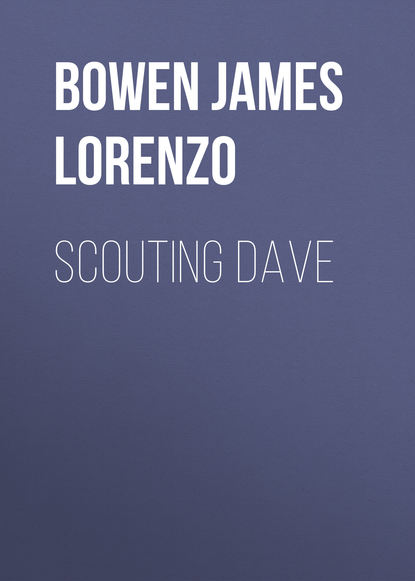По всем вопросам обращайтесь на: info@litportal.ru
(©) 2003-2025.
✖
Scouting Dave
Настройки чтения
Размер шрифта
Высота строк
Поля
The canoe was again turned across the Mississippi. The men it contained were still in the best of spirits, for, although they had met with trial and danger, it had only stimulated them to greater exertions.
As they reached the opposite shore, the scout ceased paddling, and motioned Charles to do the same.
“Blame me, if I kin hardly tell whar’ that place is,” he muttered, half perplexed. “It’s more’n two years since I had occasion tew use it, and may be ’twill bother me some to find it. But it may be of use to us, so I’ll ferret it out.”
They floated cautiously down for a few rods, when David uttered a quick exclamation of joy.
“There it is!”
“Can’t ye diskiver it?” he asked.
“I confess,” returned Charles, “that I should never suspect the existence of any hidden retreat here.”
The scout laughed, quietly.
“Nater made the place rayther secure,” he said; “and, if yer young eyes don’t suspect it, I guess there’s little danger o’ the red-skins spyin’ it out.”
Turning the head of the canoe shoreward, David carefully parted the bushes with his oar, and a dark retreat was revealed. With little effort, the canoe was pushed within the haven; the bushes closed behind them, effectually securing them from observation. Charles and Alfred glanced around, in the endeavour to discover the extent and surroundings of the place. The effort was futile. Overhanging masses of bushes shut out all rays of light, leaving the place clothed in deepest darkness.
The scout seemed perfectly at home. Turning the head of the canoe to the right, he gave a vigorous push, and, as the bottom of the boat struck the shore, grasped his rifle and leaped forth. As soon as the brothers could determine upon his whereabouts, they followed.
“Remove the paddles,” he said, cheerily, “and then we will attend to hidin’ the canoe!”
This was done, when the scout set about concealing the craft. Rocking it, until partially filled with water, he stepped into the river, and, with a strong motion, pushed it completely beneath the overhanging bank. It wedged in firmly, and, securing the oars, David once more stood upon the bank.
“I call this good fortin’!” he commenced, as they left the place. “We’re acrost the Missippy, the canoe stowed away, an’ nary a red the wiser for’t. To be sure, the wust is tew come! But most of the imps are acrost the river, an’ that’ll be a great ’vantage tew us. I know where Emily is – poor girl! We’ll git thar’ in good time, an’, when we do, we’ll make our presence known.”
“That we will!” exclaimed Charles, with enthusiasm. “But tell me, Davy, do you think Ashbey will be there soon? Do you think he will torture Emily with his detested presence before we can reach and save her?”
“I can’t tell,” the scout replied. “I hardly think he will cross the river ag’in for some days, unless he suspects where we’re gone tew. But we’re here fust, and kin ’tend tew him when he comes.”
CHAPTER VII.
THE CAPTIVE
But what of the captive maid? When she found herself alone with her red guards, and realized that Ashbey had indeed left her for a time, a sense of relief followed. There was something in his presence which seemed to poison the very air about her. Scarcely did she heed that her horse was led from the fatal spot; hardly was she conscious that they were striking into the forest, and taking a direct course toward the Mississippi. She had little thought, feeling or care for herself. What was life to her now?
Her father – the fond, doting parent, to whom she had been the bright sunshine of existence, and whom she had loved with all the devotion of her filial heart, was dead – inhumanly butchered by the ferocious foes, who had thus remorselessly destroyed the peaceful home-circle of hearts. The fiery George, whom she had loved and guided with the fond sister’s care, had met an untimely fate in the morning of his bright life.
And she thought of another, for whom her fondest, holiest love had gone forth; and oh! what an agony of suspense was there. What was his fate? What a fierce enemy upon his track – a man so far below the savage that the very brute might shun his company – she could only picture to herself a fate so fearful that the very thought of it seemed to check the life-current in her veins. Oh! that she could fly to him – could warn and save him. Could it be that she should ever again hear his voice? It was a fearful thought, yet she could only faintly hope against it.
No word escaped the lips of the stern warrior guard who surrounded her, and Emily felt glad that it was so, for she was in no mood to talk. As one devoid of life, she sat upon her horse – the bitterest anguish surging over her soul like a destroying flood.
How long they had journeyed thus she could not have determined; indeed, she made no effort to recall the distance or time. She was only sensible that the party had stopped, and a muscular brave had lifted her from the horse to the ground. Not till this done was she really aware of what was passing about her.
The Indian relaxed his hold, and she sunk to the earth, feeling too exhausted to stand. The brave then produced a thong of deerskin, and stooped as if to find her ankles. With a gesture so appealing that even the heart of the fierce savage was touched, she besought him not to bind her. The Indian, a tall, muscular brave, raised his eyes and gazed for a moment upon the pain-marked features of the maiden. He looked irresolute, and a touch of kindness seemed overspreading his tawny features.
“White squaw run away,” he remarked, with tolerable pronunciation.
“Why should I attempt that?” she asked. “Where would my feeble limbs serve to carry me?”
“Suppose Injin brave no tie White Bird?” he asked, in a still more kindly manner.
“I will thank him,” was the brief reply.
“Red Wing will leave White Bird free,” he remarked, looking hastily round to see if his movements were observed.
The others were all busily employed in collecting wood, preparing meat for roasting, and the various duties of a bivouac. The Indian noticed this, and leaned idly against a tree, while Emily again relapsed into a sorrowful reverie.
The savages soon had a large fire, and were seated around it, employed according to their fancies or appetites. One of them approached the prisoner, and offered her a liberal slice of well-roasted venison. She refused it, for she could not eat, and the brave, with a scowl of anger, returned to his seat beside the fire.
Indolently squatted around the fire, smoking or dozing, the party remained for an hour, when the signal was given, and they began to prepare for the continuation of their journey. The braves were in the worst possible humour, for they disliked the idea of being sent back with a single captive, when they had expected to remain and take part in the work of destruction and bloodshed.
The horse Emily had ridden was tied to a sapling near by, and the Indian she had previously displeased, now unfastened and led it to her side. A sullen scowl was upon his features, as he seized the maiden by the arm with a grasp which caused her to cry out with pain. Red Wing, who had been standing near Emily, was upon the point of lighting his pipe at the fire. Hearing the outcry, he turned quickly, and with fierce displeasure upon his features, sprung at once to the scene. With a powerful grasp upon the arm of the offending savage, he hurled him back, and stood like a tower of strength before the affrighted maiden.
“Why does Red Wing place his hand thus upon another brave?” demanded the incensed savage, his very utterance almost choked with passion.
“Why does the Dark Cloud seek to harm the pale-face maiden?” retorted Red Wing.
“Does Red Wing think to take the pale-face to his own lodge, that he is thus careful of her?” was the sarcastic response.
“The White Bird speaks kindly to the Red Wing; he will not forget,” was the sententious rejoinder.
For a time the two stood looking at each other; then the Dark Cloud stepped to one side and attempted to pass his opponent. But the latter divined his intention, and, grasping him by the throat, hurled him backward with such force that he was almost thrown to the ground. Furious now past all control, Dark Cloud drew his knife, and prepared to rush upon his foe. Red Wing seized his hatchet, and awaited the onset. Others of the party, seeing they were likely to lose at least one of their most chivalrous braves, interposed to stay the conflict.
“Why will not the red braves learn wisdom?” demanded the chief of the party, with a voice of authority. “Why will they war upon each other? The blood of the pale-faces only should flow at their hands.”
By threats and persuasion a reconciliation was effected. The two braves returned their weapons and moved moodily from the spot, while the journey was at once resumed.
On they tramped, mile after mile, through the forest, until at length morning broke over the earth. But the dawn brought no relief to the prisoner. As the light increased, the dusky features of her attendants were brought more fully to view, with all their horror of war-paint and inhuman ferocity.
At length the party emerged upon the banks of the Mississippi. The guards, who were loitering about the flotilla, flocked around the fair prisoner with the greatest expressions of curiosity and satisfaction. A huge dug-out, capable of carrying the entire party, was launched, and they set forth across the stream.
Poor Emily gazed into the yellow waters of the mighty river. How calmly they flowed. Oh! that she could rest beneath them. Then all sorrow would end, and she could join those loved ones gone before. She would make the attempt, and God forgive her if she came unbidden to his presence. It was a fearful resolve, but she was unable to reason. Only wishing to rid herself of a life which could bring naught but misery, she awaited the propitious moment to carry out her plan.
It came at length. No eye seemed upon her. Rising, she closed her eyes, and with a desperate leap plunged, not into the water, but into the strong arms of the watchful Red Wing. Seating her upon the thwart from which she had risen, he said, in tones of kindness:
“White Bird must not die. Great chief love White Bird, and make her very happy. Pale-face must live for pale-face.”
Emily did not reply. She sunk down with a bursting heart, and wept the bitterest tears of her life.
Soon the boat reached the shore, and the party hastily clambered out. No sooner did Emily step forth than the savages set forward, without waiting for her to mount. But they soon stopped and made preparations for lighting a fire. Around this they stretched themselves, and soon were dozing. The maiden was securely bound, and left without a guard.
For a long time she sat and watched the lazy motions of the barbarians, until all except the outlaying guards were asleep. Then she, too, sunk into a disturbed slumber. Strange visions and dreams were hers, as she lay thus, with the bare earth for a couch, her arm for a pillow, the leafy trees and blue sky for a covering. Her sleep of innocence was soothing and strengthening to her overtasked frame.
She was awakened by a hand upon her shoulder, and a guttural voice in her ear, speaking in incomprehensible tones. The savage spoke no English, but pointed to his comrades, now about to resume their journey. He unbound the thongs and raised her to her feet.
The brief slumber which the poor girl had enjoyed had been of infinite service to her. She felt more calm and self-possessed; a sense of resignation she had not before felt, took possession of her heart. Could it be that in her sleep some fond spirit had hovered near, and whispered words of cheer and consolation?








